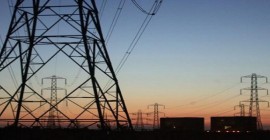Local Parties Responsible for Power Cut, Officials Say.
Imad Rajabi – Palestine Economy Portal
Translated by Tamara Barakat
There is no doubt that the Israeli Occupation is responsible for the power cut in Palestine in general since most of the electricity is imported from Israel, and Israel controls the electricity connection points and their number.
Moreover, Israel justifies not supplying Palestinians with electricity with the debts accumulating on the Palestinian electricity companies. It illegally deducts the owed money from the tax clearance revenues, which increased the net lending.
The power cut in Jenin highlighted this Israeli justification, and questioned why the Palestinian companies do not prevent Israel from having a legal justification by paying the debts accumulating on them.
Many sources from the Palestinian Electricity Regulatory Council, the Ministry of Local Government, the Northern Electricity Distribution Company (NEDCO), and the Municipality of Jenin to whom the Palestine Economy Portal spoke agreed that the problem lies in local parties not affiliated with the electricity companies who do not pay their electricity bills. This gives Israel a justification to cut the electricity supply, like what happened in Jenin.
The Director of the Electricity Regulatory Council, Zafer Melhem, said that there is a real problem caused by the local parties that do not pay their debts to the electricity companies, despite the fact that they collect the money from the citizens. They are used to having Israel deduct the debts from the tax clearance revenues while spending the money they collected on salaries, miscellanies, food expenses…” He emphasized that some parties are not disciplined.
According to the Regulatory Council’s data, the local parties debts to the electricity companies are currently 260 million shekels, while their tax revenue clearance bills are about 3 billion shekels. The Jerusalem District Electricity Company is not included in the clearance since Israel does not deduct from it.
To Solve the Problem, the Government is Raising the Issue Internationally
Melhem affirmed that the Council does not have the capacity to force the municipalities to pay their electricity bills unlike the private companies. He said that the private companies are good at meeting their obligations and paying their bills.
However, the Council and the Government are trying to raise the issue internationally through the European Union, the Quartet, and the World Bank to pressure Israel into changing its policies regarding the electricity. “Israel imposes high electricity costs. There are no agreements between us and they deal with us on the basis of military orders as though we were in Israel.”
He emphasized the necessity of finding a solution now since electricity consumption keeps on increasing due to the increase in the numbers of the population, companies and stores. Israel does not take these conditions into consideration and does not permit an increase in the electricity supply through the connection points until all debts are paid.
Clearance above the Normal Limit, Deductions will only be Made When Necessary
Melhem affirmed that the clearance revenues cannot withstand any more deductions, and that deductions will only be made when absolutely necessary. Until now, 9 billion shekels were deducted from the clearance revenues to cover the electricity bills of municipalities and companies in the West Bank and Gaza. He explained that 40 million shekels are transferred monthly from the clearance to Israel to cover the electricity bills of Gaza. Now, this money has reached 5 billion shekels.
Consequently, the net lending, which is included in the deductions by Israel along with the water and electricity bills, increased to 1073.2 billion shekels instead of the anticipated 800 million shekels in the budget. Data published by the Ministry of Finance show that the average monthly deductions from the net lending are 80 million shekels.
An official in the Ministry of Local Government said that there is a problem that lies in the local parties that do not pay their debts.
Increase in Measures on Local Parties to Decrease the Debts
The Director General of Financial Affairs at the Ministry, Ghassan Daraghmeh, told the Palestine Economy Portal that the Ministry started taking serious steps toward the debts accumulated on these local parties.
A source from the NEDCO confirmed that the company pays its bills that reach 9 million shekels, but the municipalities that are not affiliated with the company procrastinate transferring the money to it, in order to pay it to the Israeli side.
The NEDCO borrowed 50 million shekels from banks to solve the electricity crisis, specifically in Jenin after it witnessed several protests.




